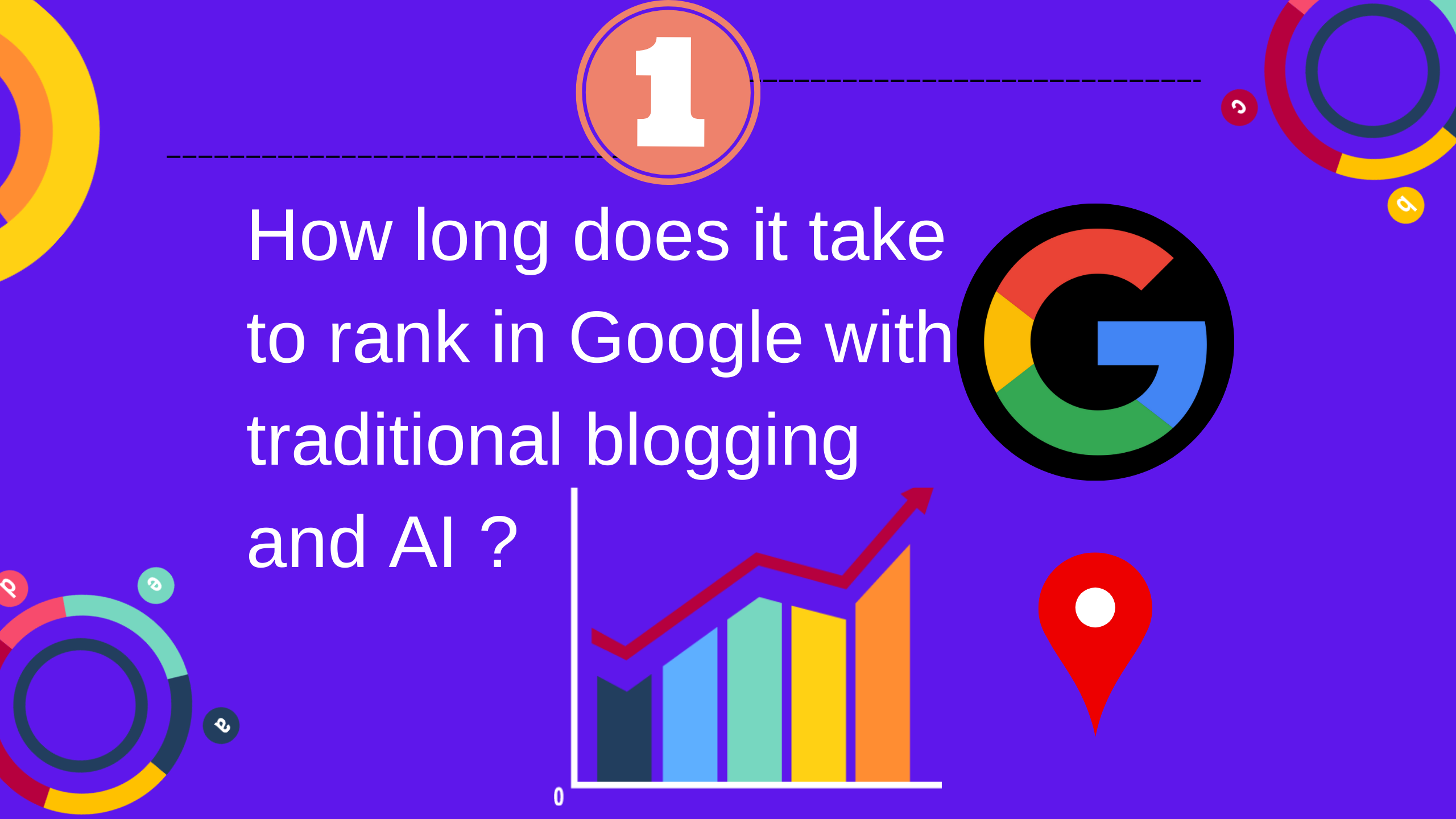Blogging is now a crucial component of both individual and business digital marketing strategy. Ranking on Google is essential for the success of your blog, regardless of whether you’re beginning it to promote your business or for personal reasons. The question that arises is: Using traditional blogging and AI, how long does it take to rank in Google in 2023? We’ll look at the solution to this issue and talk about how AI can help you rank better in this blog post.
- Traditional Blogging and Ranking on Google
- The Importance of SEO in Blogging
- How AI Can Help with Blogging
- Using AI for Keyword Research
- Using AI for Content Creation
- Using AI for On-Page Optimization
Traditional Blogging and Ranking on Google:
Traditionally, blogging has involved creating information on a certain subject and posting it online. After your blog post has been posted, you should optimise it for search engines to improve its position on search engine result pages (SERPs). The quality of your content, on-page optimisation, backlinks, and user experience are just a few of the variables that affect your Google ranking.
There is no secret strategy for getting a high Google ranking. Google has provided us with some guidelines on what constitutes quality content, though. Making valuable content for your audience and producing high-quality, engaging content are the keys to ranking in Google. Your content will rank better in Google search results if it is valuable and educational.

The Importance of SEO in Blogging:
Search engine optimisation, or SEO. It is a collection of methods used to increase the visibility of your website in search results. To make your website easier for search engines to scan and index, SEO entails optimising its content, structure, and technical elements.
SEO is essential for blogging because it raises your blog’s search engine ranking. Your blog will be more visible when it ranks higher, which will increase visitors, leads, and sales. Without SEO, your blog would appear far down in search engine results pages, making it difficult for users to find your material.
How AI Can Help with Blogging:
The development of artificial intelligence (AI) is revolutionising the way we develop content and improve websites. We can rank higher in search engines by using AI-powered technologies to assist us with keyword research, content production, and on-page optimisation.
Using AI for Keyword Research:
Any good SEO campaign must start with keyword research. It entails identifying the appropriate keywords that people in your niche are using to search. You can locate profitable keywords that are pertinent to your niche with the use of AI-powered tools like Google’s Keyword Planner. Additionally, you can locate long-tail keywords with less competition, which will make it simpler for you to rank higher.
Using AI for Content Creation:
The core of blogging is creating content. It might take a lot of time and effort to produce entertaining and educational content. You can produce high-quality content quickly with AI-powered tools like Article Forge and Articoolo. These programmes create original, educational, and interesting content using natural language processing (NLP). They may also assist you in coming up with titles and content ideas.
Using AI for On-Page Optimization:
The practise of improving your web pages so that they are more search engine friendly is known as on-page optimisation. It entails optimising your website’s content as well as its title tags, meta descriptions, photos, and other aspects. You can quickly and easily optimise your web pages for search engines with AI-powered solutions like Yoast SEO and Rank Math. These tools may evaluate your content and make suggestions for changes that will raise your search engine ranking.
Conclusion:
The time it takes to rank in Google depends on various factors, including the competition, the quality of the content, and the backlinks. With traditional blogging, it can take several months to see results, and it can take even longer to rank for highly competitive keywords. With AI-generated blogging, it is possible to create a large volume of content quickly, but it can be difficult to optimize for search engines, and the quality of the content may not be as high as human-written content.
Factors influencing blog’s Google ranking
The capacity of a website to rank highly in search results is influenced by a variety of elements when it comes to search engine optimisation (SEO). The substance of a website’s age is a consideration that hasn’t gotten much attention. In this blog article, we’ll look at the average age of Google’s top-ranking pages and talk about what that means for SEO.
Table of Contents:
Methodology:
Using Ahrefs, a well-known SEO tool, we did a study to find out how old the top-ranking Google sites were. We looked at the top 10 pages for 2 million randomly chosen keywords from a range of markets. Each page’s age was determined based on the date it was initially indexed by Google and the date it was last updated.
Results:
According to our research, the top-ranking Google pages are 2-3 years old on average. Nevertheless, the age distribution varied significantly depending on the term and specialisation. For instance, pages that rank for news-related keywords tend to be considerably younger than pages that rank for more timeless subjects.
We discovered that pages that rank in the top three spots typically have a longer age than pages that rank in positions four through ten. This shows that getting high rankings in competitive niches may depend more on age.
Discussion:
One of the many variables that affect a page’s potential to rank highly in search results is its age. Additionally important factors include backlinks, content quality, and user interaction. Our research, however, contends that age shouldn’t be disregarded as a ranking criterion, particularly in highly competitive industries.
The fact that older pages typically tend to gather more backlinks and social shares over time, which can indicate to search engines that the information is quality and relevant, may be one explanation for the significance of age. Furthermore, it’s possible that older pages have a stronger presence in search results, which can make it more challenging for younger pages to outrank them.
Implications:
Our study’s conclusions have various ramifications for SEO professionals. To keep your content’s relevancy and freshness, you must first constantly update and revamp it. This can increase your chances of ranking well in search results and assist to offset the benefit of older pages.
Second, it’s crucial to concentrate on information that will always be relevant. You can boost the likelihood that your pages will continue to rank highly in search results for years to come by producing content that offers long-term value to your audience.
Finally, it is crucial to persevere with your SEO efforts while being patient. It takes time and work to rank highly in search results, and it can take months or even years before you start to notice any real changes. However, you may gradually increase your chances of success by concentrating on high-quality content and efficient SEO techniques.
Conclusion:
In conclusion, our research indicates that a page’s age has a significant role in how well it performs in search engine rankings. When creating an SEO strategy, it is important to take into account the age of your content, even though other elements like backlinks and content quality are as important. Your chances of long-term success at attaining high ranks in search results can be increased by concentrating on producing evergreen content and consistently updating your pages.


[…] of the most well-known experts in artificial intelligence (AI), Geoffrey Hinton, recently left Google after working there for more than ten years. The man dubbed the “Godfather of AI,” […]